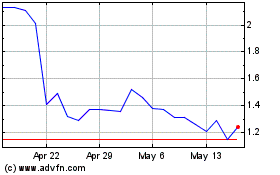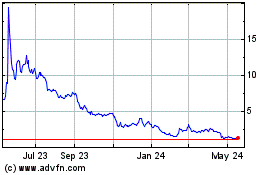Hepion Pharmaceuticals Discovers Novel Rencofilstat Action in Liver Cancer
September 19 2023 - 8:00AM

Hepion Pharmaceuticals, Inc. (NASDAQ:HEPA), a clinical stage
biopharmaceutical company focused on Artificial Intelligence
(“AI”)-driven therapeutic drug development for the treatment of
non-alcoholic steatohepatitis (“NASH”), fibrotic diseases,
hepatocellular carcinoma (“HCC”), and other chronic diseases, today
announced new research findings uncovering a previously unknown
mechanism by which Hepion’s lead drug candidate, rencofilstat, may
exert anti-cancer activity.
The research involved a technique called ATAC-Seq (“assay for
transposase-accessible chromatin with sequencing”) that determines
what specific DNA sequences are in open or closed states. Gene
expression occurs from DNA sites that are in an open state, whereas
genes within closed regions are silent. Hepion’s ATAC-Seq
experiments on two liver cancer cell lines revealed that
rencofilstat significantly changed the open-closed state of DNA.
Approximately 4,500 sites were altered within one hour of treatment
in both cell lines, which was slightly more than a chemotherapeutic
compound, azacytidine, known to alter DNA structure. The
predominant effect of rencofilstat – opening or closing – depended
on the cell line. Rencofilstat predominantly closed DNA in the cell
line in which it also suppressed cell growth, suggesting that the
drug candidate’s anti-cancer effect on the cells resulted in part
from DNA closure and gene silencing.
Another interesting finding was the types of genes that became
accessible/inaccessible due to rencofilstat treatment. DNA sites
that were opened by rencofilstat were enriched for several
well-known tumor suppressor genes such as CDKN1A (p21), PTEN,
HINT1, KLF6 and SOCS1; whereas a tumor-promoting oncogene, NOTCH1,
was predicted to be silenced by rencofilstat. Accessibility also
changed for many genes related to apoptosis, consistent with
increasing cancer cell death. Thus, changes in gene accessibility
produced by rencofilstat favored an anti-cancer mode of action.
Follow-up experiments are planned to further understand the impact
on cancer cell growth.
“Anti-tumor effects of rencofilstat and other
cyclophilin inhibitors observed in many preclinical studies have
been attributed to several mechanisms, but changes in DNA
accessibility and especially those that potentially limit
oncogenesis have never before been reported for this class of
drug,” explained Dr. Daren Ure, Hepion’s Chief Scientific Officer.
“Knowing now that rencofilstat can modify DNA chromatin structure
and regulate what genes are turned on and off gives us new
appreciation for the scope of rencofilstat’s actions.”
“Rencofilstat previously received Orphan Drug
designation for the treatment of NASH. Hepion has also received FDA
clearance to begin a Phase 2 clinical trial of rencofilstat in HCC,
which remains the most common type of liver cancer, accounting for
up to 90% of all primary liver cancers. We believe rencofilstat may
be well-positioned to offer a unique approach to treating both NASH
and HCC, as these diseases are often intertwined,” commented
Hepion’s CEO, Robert Foster. “These newest findings reported today
strengthen our resolve to initiate Phase 2 HCC trials pending
adequate financial resources. More broadly, rencofilstat’s
cumulative properties – liver-targeting, antifibrotic, anti-cancer,
antiviral – reinforce Hepion’s focus on two of the most serious
liver diseases of the day, NASH and HCC.”
About Hepion
Pharmaceuticals
The Company's lead drug candidate, rencofilstat,
is a potent inhibitor of cyclophilins, which are involved in many
disease processes. Rencofilstat has been shown to reduce liver
fibrosis and hepatocellular carcinoma tumor burden in experimental
disease models and is currently in Phase 2 clinical development for
the treatment of NASH. In November 2021, the U.S. Food and Drug
Administration (“FDA”) granted Fast Track designation for
rencofilstat for the treatment of NASH. That was followed in June
2022 by the FDA’s granting of Orphan Drug designation to
rencofilstat for the treatment of HCC.
Hepion has created a proprietary Artificial
Intelligence deep machine learning (“AI/ML”) platform designed to
better understand disease processes and identify patients that are
rencofilstat responders. This AI/ML has the potential to shorten
development timelines and increase the observable differences
between placebo and treatment groups. In addition, Hepion’s AI/ML
can be used to drive its ongoing NASH and HCC clinical development
programs and identify other potential therapeutic indications for
cyclophilin inhibition with rencofilstat.
Forward-Looking Statements
Certain statements in this press release are
forward-looking within the meaning of the Private Securities
Litigation Reform Act of 1995. These statements may be identified
by the use of forward-looking words such as “anticipate,”
“believe,” “forecast,” “estimated,” and “intend,” among others.
These forward-looking statements are based on Hepion
Pharmaceuticals’ current expectations and actual results could
differ materially. There are a number of factors that could cause
actual events to differ materially from those indicated by such
forward-looking statements. These factors include, but are not
limited to, substantial competition; our ability to continue as a
going concern; our need for additional financing; uncertainties of
patent protection and litigation; risks associated with delays,
increased costs and funding shortages caused by the COVID-19
pandemic; uncertainties with respect to lengthy and expensive
clinical trials, that results of earlier studies and trials may not
be predictive of future trial results; uncertainties of government
or third party payer reimbursement; limited sales and marketing
efforts and dependence upon third parties; and risks related to
failure to obtain FDA clearances or approvals and noncompliance
with FDA regulations. As with any drug candidates under
development, there are significant risks in the development,
regulatory approval, and commercialization of new products. There
are no guarantees that future clinical trials discussed in this
press release will be completed or successful, or that any product
will receive regulatory approval for any indication or prove to be
commercially successful. Hepion Pharmaceuticals does not undertake
an obligation to update or revise any forward-looking statement.
Investors should read the risk factors set forth in Hepion
Pharmaceuticals’ Form 10-K for the year ended December 31, 2022,
and other periodic reports filed with the Securities and Exchange
Commission.
For further information, please contact:
Stephen KilmerHepion Pharmaceuticals Investor
RelationsDirect: (646) 274-3580skilmer@hepionpharma.com
Hepion Pharmaceuticals (NASDAQ:HEPA)
Historical Stock Chart
From Jan 2025 to Feb 2025

Hepion Pharmaceuticals (NASDAQ:HEPA)
Historical Stock Chart
From Feb 2024 to Feb 2025
